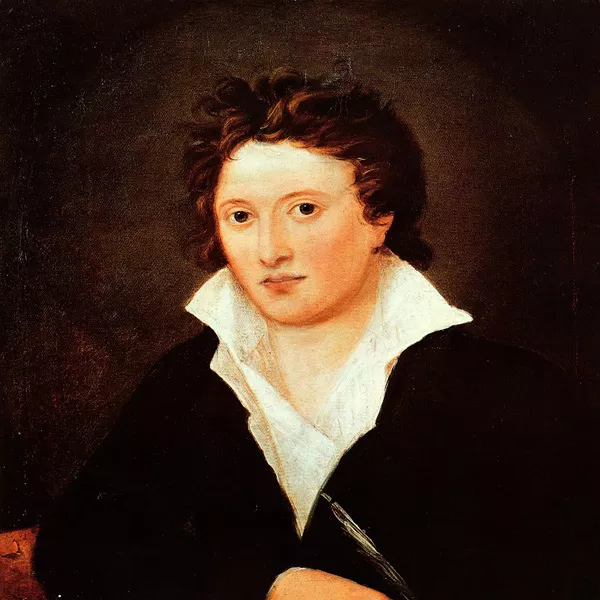
Percy Bysshe Shelley (1792–1822) was one of the leading figures of the Romantic movement, renowned for his lyrical brilliance, radical ideals, and visionary imagination. His poetry often explores themes of nature, political freedom, and the transcendent power of love and art. Though his life was tragically short, Shelley’s work profoundly influenced literature and modern thought.
Percy Bysshe Shelley Biography
Percy Bysshe Shelley was born on August 4, 1792, in Horsham, Sussex, England, into a prominent and wealthy family. Educated at Eton College and later at the University of Oxford, Shelley displayed an early fascination with philosophy and radical ideas. At Oxford, he co-authored a pamphlet titled The Necessity of Atheism, leading to his expulsion—a decision that estranged him from his conservative father.
In 1811, Shelley eloped with Harriet Westbrook, a controversial decision that exemplified his defiance of societal norms. However, the marriage soon disintegrated as Shelley’s restless intellect and personal aspirations clashed with Harriet’s expectations. Around this time, Shelley began producing his earliest significant works, including Queen Mab (1813), a radical poem advocating for social and political reform.
By 1814, Shelley had become romantically involved with Mary Wollstonecraft Godwin, the daughter of radical thinkers Mary Wollstonecraft and William Godwin. Their union, though scandalous, would define the rest of his life. Together, they traveled extensively across Europe, seeking inspiration from nature, art, and revolutionary ideals. Their relationship endured personal tragedies, including the deaths of several of their children.
Shelley’s mature period as a poet coincided with his exile in Italy, where he produced many of his masterpieces, including Ozymandias, To a Skylark, and Prometheus Unbound. He forged friendships with other literary luminaries, including Lord Byron and Leigh Hunt, though he often felt isolated by his unorthodox beliefs and lifestyle.
Shelley’s life ended abruptly on July 8, 1822, when his schooner, the Don Juan, sank during a storm off the Italian coast. His body was cremated on the beach, and his ashes were interred in the Protestant Cemetery in Rome. Despite limited recognition during his lifetime, Shelley’s legacy as a poet and intellectual grew posthumously, cementing his place among the greats of English literature.
Percy Bysshe Shelley Poems
Shelley’s poetic output is characterized by its lyrical beauty, intellectual depth, and passionate advocacy for freedom. Below is a selection of his most significant works:
1.“Ozymandias”
One of Shelley’s most famous sonnets, Ozymandias reflects on the ephemeral nature of power and human achievement. The vivid imagery of a ruined statue in the desert underscores the inevitability of time’s erasure.
2.“To a Skylark”
A celebration of the skylark’s song, this lyric poem contrasts the bird’s carefree joy with human struggles, embodying Shelley’s longing for transcendence and artistic inspiration.
3.“Prometheus Unbound”
A lyrical drama, this ambitious work reimagines the Greek myth of Prometheus as a symbol of human liberation and defiance against tyranny. It is a profound meditation on hope, revolution, and renewal.
4.“Adonais”
An elegy for fellow poet John Keats, Adonais mourns Keats’s untimely death while affirming the immortality of artistic genius. The poem’s emotional intensity and rich symbolism make it a masterpiece of Romantic elegy.
5.“The Masque of Anarchy”
A political poem written in response to the Peterloo Massacre, this work advocates for nonviolent resistance and denounces oppression. The refrain, “Rise like lions after slumber,” became a rallying cry for reform movements.
6.“The Cloud”
A lyrical exploration of nature’s cycles, this poem personifies the cloud as a dynamic, ever-changing force, reflecting Shelley’s fascination with the interplay of nature and imagination.
7.“Hymn to Intellectual Beauty”
In this philosophical ode, Shelley reflects on the elusive, transformative power of beauty and its role in inspiring human creativity and understanding.
8.“Mont Blanc”
This poem combines awe for the sublime grandeur of nature with profound meditations on existence and the human mind. The majestic Mont Blanc serves as both subject and symbol.
9.“Epipsychidion”
A passionate exploration of love and idealism, this poem celebrates the spiritual union of souls while critiquing societal constraints on love and freedom.
10.“Alastor; or, The Spirit of Solitude”
One of Shelley’s early major works, this narrative poem examines the journey of a poet in search of an idealized beauty, reflecting Shelley’s own intellectual and emotional quests.
Shelley’s poetry remains celebrated for its lyrical intensity, philosophical depth, and its embodiment of Romantic ideals.
Percy Bysshe Shelley Quotes
1.“Poets are the unacknowledged legislators of the world.”
2.“Fear not for the future, weep not for the past.”
3.“Our sweetest songs are those that tell of saddest thought.”
4.“Nothing in the world is single; all things by a law divine in one another’s being mingle.”
5.“Man has no right to kill his brother. It is no excuse that he does so in uniform.”
6.“The more we study, the more we discover our ignorance.”
7.“A poet is a nightingale, who sits in darkness and sings to cheer its own solitude with sweet sounds.”
8.“Soul meets soul on lovers’ lips.”
9.“Rise like lions after slumber in unvanquishable number.”
10.“If winter comes, can spring be far behind?”
Percy Bysshe Shelley Facts
1.helley was expelled from Oxford for refusing to recant his atheistic views.
2.His first wife, Harriet Westbrook, tragically died by suicide.
3.Shelley’s second wife, Mary Shelley, authored Frankenstein.
4.He was an avid supporter of political and social reform, including Irish independence and the abolition of monarchy.
5.Shelley’s death at sea was caused by a sudden storm, and his body was identified by a volume of Keats’s poetry found in his pocket.
6.He was cremated on a beach in Italy, but his heart was said to remain unburned and was kept by Mary Shelley.
7.Shelley had a tumultuous friendship with Lord Byron, marked by mutual admiration and rivalry.
8.Many of Shelley’s works were censored during his lifetime due to their controversial themes.
9.Shelley’s phrase “Poets are the unacknowledged legislators of the world” has become a defining statement about the power of poetry.
10.Despite his aristocratic background, Shelley passionately opposed social inequality and oppression.
